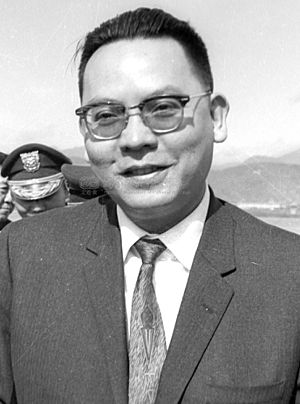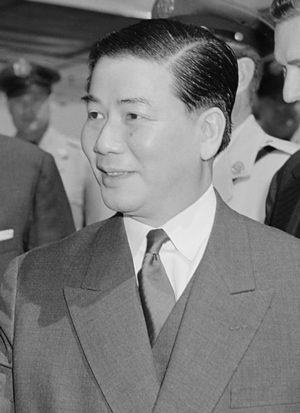Trần Thiện Khiêm facts for kids
Quick facts for kids
Trần Thiện Khiêm
|
|
|---|---|

Khiêm in 1965
|
|
| 8th Prime Minister of the Republic of Vietnam | |
| In office 23 August 1969 – 5 April 1975 |
|
| President | Nguyễn Văn Thiệu |
| Vice President | Nguyễn Cao Kỳ Trần Văn Hương |
| Deputy | Nguyễn Lưu Viên |
| Preceded by | Trần Văn Hương |
| Succeeded by | Nguyễn Bá Cẩn |
| Minister of National Defense of the Republic of Vietnam | |
| In office 6 August 1972 – 14 April 1975 |
|
| Prime Minister | Himself Nguyễn Bá Cẩn |
| Preceded by | Nguyễn Văn Vy |
| Succeeded by | Trần Văn Đôn |
| In office 8 February 1964 – 9 September 1964 |
|
| Prime Minister | Nguyễn Khánh Nguyễn Xuân Oánh Acting Nguyễn Khánh |
| Preceded by | Trần Văn Đôn |
| Succeeded by | Nguyễn Khánh |
| Personal details | |
| Born | 15 December 1925 Saigon, Cochinchina, French Indochina |
| Died | 24 June 2021 (aged 95) San Jose, California, US |
| Political party | |
| Signature | |
| Military career | |
| Allegiance | |
| Service/ |
|
| Years of service | 1947–1975 |
| Rank | |
| Commands held |
|
| Battles/wars |
|
| Other work |
|
General Trần Thiện Khiêm ([ʈəŋ˨˩ tʰiəŋ˨˩˨ kʰim˧˧]; 15 December 1925 – 24 June 2021) was an important soldier and politician in South Vietnam. He served as an officer in the Army of the Republic of Vietnam during the Vietnam War. He was born in Saigon, which is now part of Vietnam.
During the 1960s, Khiêm was involved in several major political changes, often called "coups." A coup is when a small group of people, usually military, suddenly takes control of the government. He helped President Ngô Đình Diệm stop a coup attempt in November 1960 and was promoted. However, in 1963, he was part of a different coup that removed President Diệm from power.
Later, he joined with Nguyễn Khánh to lead a successful coup in January 1964. After some disagreements, Khiêm was sent away to be an Ambassador. He returned to Vietnam when the political situation improved. He became Prime Minister under President Nguyễn Văn Thiệu. He stayed in this role until April 1975, just before the fall of Saigon.
Contents
Becoming a Leader
Khiêm finished his military training at the Vietnamese National Military Academy in Đà Lạt in July 1947. He quickly rose through the ranks. By 1951, he was a captain, and by 1954, a major.
In 1957, as a colonel, he became a Deputy Chief of General Staff. He also attended the United States Army Command and General Staff College in the US. When he returned, he led the 4th Field Division until 1960. Later that year, he took command of the 5th Division.
Stopping a Coup in 1960
On November 11, 1960, some colonels tried to overthrow President Diệm. They surrounded the palace but paused to talk about sharing power. President Diệm made false promises of change to buy time. The rebels had not blocked the roads into the capital, which allowed loyal troops to arrive.
Khiêm was loyal to Diệm and brought tanks from the Second Armored Battalion. His men approached the palace while Diệm was still talking to the rebels. Some rebels even switched sides as Khiêm's forces arrived. After a short but intense fight, the coup failed. Khiêm was promoted to brigadier general for his actions. He was later made a major general in December 1962.
The 1963 Coup Against Diệm
In 1963, Khiêm was part of a secret plan to remove President Diệm. Many officers did not fully trust each other because Diệm was known for outsmarting plotters.
On the day of the coup, Khiêm pretended to be upset and said he wanted to stop the plan. He did this to test if another general, Tôn Thất Đính, was truly committed to the coup. Khiêm later said he put eye drops in his eyes to make them red, so it looked like he was crying.
During the coup, Khiêm's forces helped attack the presidential palace. Diệm and his brother escaped, but Khiêm ordered his subordinate, Phạm Ngọc Thảo, to find them. Khiêm told Thảo to make sure the brothers were not hurt. However, Diệm and his brother were later killed while being taken to military headquarters.
The 1964 Coup Against Minh
After the 1963 coup, Khiêm was given a less important job. He became the commander of the III Corps around Saigon. Feeling unhappy, Khiêm joined another coup plot.
This new plot was started by Brigadier General Đỗ Mậu. He was joined by Khiêm, General Khánh, and Thi. Khánh became the main leader of this group. Khiêm, being Catholic, was worried that leading the coup himself might upset Buddhist groups.
The coup was planned for January 30. Khiêm's forces surrounded the homes of the sleeping government leaders in Saigon. Khánh and paratroopers took over the military headquarters. Khiêm accidentally overslept and forgot to set his alarm clock. Despite this, Khánh took control without any fighting. The former leaders were put under house arrest. Khánh announced that he took over because the government was not doing enough against the Viet Cong. After this coup, Khiêm became the Defense Minister.
Disagreements Among Leaders
In August 1964, Khánh tried to gain more power, which led to protests. Buddhists protested, saying that Catholic groups were trying to bring back the old ways of President Diệm. Khiêm and Thiệu, who were Catholic, tried to remove Khánh. They wanted Minh to take over instead.
At a meeting, Khánh blamed the instability on Catholic groups. Khiêm, however, blamed Khánh for giving in to the Buddhist protesters. Khiêm and Thiệu wanted Minh to replace Khánh, but Minh refused. Minh said that Khánh was the only one who could get money from the US. Khiêm angrily replied that Khánh was a "puppet" of the US government.
Eventually, the leaders agreed that Khánh, Minh, and Khiêm would rule together for two months. However, Khánh still made most of the decisions. Khiêm was later blamed for supporting a failed coup attempt in September 1964.
Planning from Abroad
By the end of 1964, Khánh had won the power struggle. He sent Khiêm to Washington as an ambassador, believing Khiêm was causing problems in Saigon. Khiêm, from overseas, continued to criticize Khánh.
In January 1965, the Prime Minister, Trần Văn Hương, tried to expand the military. This led to large protests. Khánh then removed Hương from power. At this time, some Catholic officers, including Thiệu, planned to remove Khánh and bring Khiêm back from Washington. The US Embassy supported this idea but was hesitant to fully help.
The US government's relationship with Khánh had worsened. They wanted a change in leadership. On February 19, 1965, Thảo and General Lâm Văn Phát launched a coup attempt. Thảo announced on the radio that he would remove Khánh and bring Khiêm back to lead. Khiêm was part of the plot and pledged his "total support."
However, the US generals became worried about the coup leaders' strong pro-Diệm views. They feared this would cause more division in South Vietnam. The US Embassy asked that Khiêm not return to Saigon until the situation was clearer.
After a day of confusion, the coup failed. Although Khiêm did not return to Vietnam, the military leaders voted to remove Khánh from power. The new leaders decided to ignore Khiêm's involvement in the coup. He remained the ambassador in Washington.
In October 1965, Khiêm became the Ambassador to Taiwan. He served there until 1968. He then returned to Vietnam and became Interior Minister. In 1969, he became Prime Minister and Defense Minister. He held these roles until April 1975, when he resigned and left the country as the communists took over South Vietnam. However, he had little real power, as President Thiệu made most decisions.
Khiêm lived in retirement in San Jose, California, USA. He passed away on June 23 or 24, 2021, at the age of 95.
Images for kids
 | Precious Adams |
 | Lauren Anderson |
 | Janet Collins |


